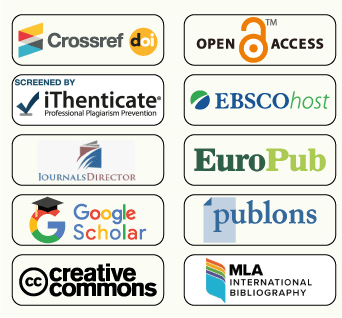Does social media impact the development of general English vocabulary? perceptions of Egyptian university students
Abstract
The importance of vocabulary in language learning cannot be overstated because meaningful communication requires a vast repertoire of words to convey ideas. Yet, social media places English language learners in multicultural communities where they can acquire new vocabulary knowledge and use it communicatively. The aim of the study is to investigate the impact of social media on learning English vocabulary at university level. A case study approach was adopted. To this end, a hypothesized model on aspects of learning English from social media was constructed. That was supported by a participant observation and a thorough review of the literature. Based on the model, a questionnaire was constructed and disseminated to a total number of 135 Egyptian undergraduate university students. Findings of the study are: 1) learning vocabulary occurs through receiving, producing and constructing vocabulary knowledge, 2) the indirect impact of social media enhances self-confidence, self-esteem, critical thinking, creativity and collaboration among Egyptian university students, 3) social media is characterized by factors that enhance vocabulary learning, and 4) social media has a few limitations that, to some extent, hinder vocabulary learning. It is recommended that further research is conducted on the effect of different social media applications on learning English language vocabulary, grammar and other aspects.
Received: 24 February 2023
Accepted: 05 March 2023
Published: 20 March 2023
Keywords
Full Text:
PDFReferences
Hanan, Ahmad, Neni Yuliani, and Taufik Suadiyatno. 2023. “The Role of Social Media on Students’ English Vocabulary Achievement.” JISIP (Jurnal Ilmu Sosial Dan Pendidikan) 7 (1). https://doi.org/10.58258/jisip.v7i1.4507 .
Ichara Sinta, Z. 2022. “Students’ Experience in Vocabulary Memorizing of Adjective by Using TikTok Duet Video.” Cybernetics: Journal Educational Research and Social Studies, 40–52.
Jadhav, V. 2020. “Role of Social Media during the Lockdown on Various Health Aspects.” Int J Appl Res 6: 236–38.
Kapoor, Kawaljeet Kaur, Kuttimani Tamilmani, Nripendra P. Rana, Pushp Patil, Yogesh K. Dwivedi, and Sridhar Nerur. 2018. “Advances in Social Media Research: Past, Present and Future.” Information Systems Frontiers: A Journal of Research and Innovation 20 (3): 531–58. https://doi.org/10.1007/s10796-017-9810-y .
Khan, Irfan Ullah, Muhammad Ayaz, and Muhammad Faheem. 2016. “The Role of Social Media in Development of English Language Vocabulary at University Level.” International Journal of Academic Research in Business and Social Sciences 6 (11). https://doi.org/10.6007/ijarbss/v6-i11/2444 .
Ko, Myong-Hee. 2019. “Students’ Reactions to Using Smartphones and Social Media for Vocabulary Feedback.” Computer Assisted Language Learning 32 (8): 920–44. https://doi.org/10.1080/09588221.2018.1541360 .
Laufer, B., and I. S. P. Nation. 2013. “The Routledge Handbook of Second Language Acquisition,” 181–94.
Mallick, A., S. Mondal, S. Debnath, S. Majumder, A. Pal, A. Verma, and M. Kule. 2022. “Security Aspects of Social Media Applications.” In Proceedings of International Conference on Frontiers in Computing and Systems: COMSYS 2021, 455–65. Singapore; Singapore: Springer Nature.
Mamudi, S. F., and T. C. S. Alamry. 2022. “Students’ Perception on The Use of Instagram to Learn English Vocabulary.” Sintuwu Maroso Journal of English Teaching 7 (1): 64–69.
McCarthy, Michael. 1990. Vocabulary. London, England: Oxford University Press.
Monica-Ariana, S., and P. Anamaria-Mirabela. 2014. “The Impact of Social Media on Vocabulary Learning Case Study Facebook.” Annals of the University of Oradea, Economic Science Series 23 (2): 120–30.
Morgan, John, and Mario Rinvolucri. 2004. Vocabulary. 2nd ed. London, England: Oxford University Press.
Nation, I. S. P. 2001. Learning Vocabulary in Another Language. Cambridge: Cambridge University Press.
Nation, P., and T. Chung. 2009. “Teaching and Testing Vocabulary.” In The Handbook of Language Teaching.
Nation, P., and R. Waring. 1997. “Vocabulary Size, Text Coverage and Word Lists.” Vocabulary: Description, Acquisition and Pedagogy 14: 6–19.
Nguyen, Nguyen Thi. 2021. “A Review of the Effects of Media on Foreign Language Vocabulary Acquisition.” International Journal of TESOL & Education 1 (1): 30–37.
Pham, Manh Tri, Thi Thanh Van Nguyen, and Thi Xuan Tu Cao. 2023. “Vietnamese Students’ Perceptions of Utilizing Social Media to Enhance English Vocabulary: A Case Study at Van Lang University.” International Journal of TESOL & Education 3 (1): 79–111. https://doi.org/10.54855/ijte.23316 .
Schmitt, N. 2007. “Current Perspectives on Vocabulary Teaching and Learning. International Handbook of English Language Teaching,” 827–41.
Schmitt, Norbert. 2010. Researching vocabulary: A vocabulary research manual. Springer.
Shvets, Alexander, Paula Fortuna, Juan Soler, and Leo Wanner. 2021. “Targets and Aspects in Social Media Hate Speech.” In Proceedings of the 5th Workshop on Online Abuse and Harms (WOAH 2021). Stroudsburg, PA, USA: Association for Computational Linguistics.
Siddiqui, Shabnoor, and Tajinder Singh. 2016. “Social Media Its Impact with Positive and Negative Aspects.” International Journal of Computer Applications Technology and Research 5 (2): 71–75. https://doi.org/10.7753/ijcatr0502.1006 .
Sivagnanam, Sutasini, and Melor Md Yunus. 2020. “Utilizing Social Media in Vocabulary Enhancement among Primary ESL Learners.” Universal Journal of Educational Research 8 (2): 490–98. https://doi.org/10.13189/ujer.2020.080220 .
Tomas, Rowena R. Sto, and Alvin T. Dulin. 2021. “Social Media Exposure and Paragraph Writing of Pre-Service Students.” Linguistics and Culture Review 5 (S3): 144–53. https://doi.org/10.21744/lingcure.v5ns3.1379 .
Zainal, Zahirrah, and Noor Hanim Rahmat. 2020. “Social Media and Its Influence on Vocabulary and Language Learning: A Case Study.” European Journal of Education Studies 7 (11). https://doi.org/10.46827/ejes.v7i11.3331 .
Zheng, B., S. Yim, and M. Warschauer. 2018. “Social Media in the Writing Classroom and Beyond. The TESOL Encyclopedia of English Language Teaching,” 1–5.
DOI: http://dx.doi.org/10.21622/ilcc.2023.03.1.030
Refbacks
- There are currently no refbacks.
Copyright (c) 2024 Amr Selim Wannas, Inas Hussein Hassan

This work is licensed under a Creative Commons Attribution-NonCommercial 4.0 International License.
Insights into Language, Culture and Communication
E-ISSN: 2812-491X
P-ISSN: 2812-4901
Published by:
Academy Publishing Center (APC)
Arab Academy for Science, Technology and Maritime Transport (AASTMT)
Alexandria, Egypt
ilcc@aast.edu

